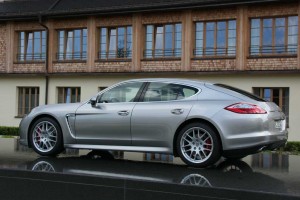
Its bid to acquire the bigger Volkswagen now in tatters, the debt-ridden sports car maker Porsche - which recently launched the Panamera, shown here - has agreed to be acquired by its larger rival.
It certainly had all the drama of a biblical battle, with family members pitted against one another, but in this case, David was the one that picked the fight. And Goliath won.
Months after the sports car manufacturer, Porsche, launched a costly campaign to gain control of its German rival, Volkswagen, the tables have turned. VW will now take over the smaller carmaker, reportedly for a price of $11.3 billion. Porsche will join a long list of prestige marques VW has acquired in recent years, including Bentley, Bugatti and Lamborghini, as well as the more mainstream luxury brand Audi.
Wendelin Wiedeking, the hard-charging manager who transformed Porsche into one of the world’s most profitable auto companies, will bail out as its CEO, but he’ll be covered by a golden parachute estimated to be worth $70 million.
Under Wiedeking, Porsche attempted to mount what has been described as one of the most audacious takeover attempts in automotive history, running up debt of almost $20 billion by some accounts in the process. During the last several years, it built up a 51% stake in Volkswagen, and more recently made it clear it wanted to take over the larger maker. And under more normal circumstances, that would have given it control of the bigger company. But when it comes to VW, one of Germany’s largest employers, things aren’t always done by the normal rules.
A special law was put in place to protect VW from unwarranted advances and to protect the state of Lower Saxony, where the carmaker is based, and which holds a so-called golden share in Volkswagen. That effectively blocked a takeover if VW refused to acquiesce.
And there was little sign the bigger maker would go along with what was, to most eyes, a battle between the two wings of the Porsche family. The late Ferdinand Porsche founded both carmakers, but VW is today controlled by his iron-willed grandson, Ferdinand Piech, while the sports car maker’s chairman is Wolfgang Porsche, Piech’s cousin.
The bid for domination might have stretched on indefinitely had not Stuttgart-based Porsche run up billions in debt in its stock acquisition binge, a yawning chasm that was soon to come due. With its options dwindling, the company was forced, in effect to sue for peace.
It will cost Wiedeking his job, though make him an even wealthier man. Though some initial reports had suggested he could receive as much as $200 million due to a profit sharing clause in his contract, the outgoing Porsche chairman is expected to get a going-away check of “just” $71 million. And reflecting the inherent German disdain for large payouts to senior management, Wiedeking has said he will create a “charitable organization” that will receive half that severance.
The executive will be replaced by Michael Macht, Porsche’s 48-year-old director of production, and a key player in the development of some of its most important recent products, such as the Boxster roadster.
One of the key questions to emerge from the settlement is how VW will handle its new acquisition. Despite its miniscule size and the fact that volume is generally seen as essential to success in the auto industry, Porsche has generated decidedly outsize profits during Wiedeking’s nearly two decade-tenure.
But some observers speculate VW might try to ramp up the numbers by consolidating product development operations or at least sharing key components between its various brands. The two companies already do so on a limited scale, since the Porsche Cayenne was developed in cooperation with VW, which produces a version of the SUV, the Touareg, for its own showrooms.
But VW Chief Executive Officer Martin Winterkorn has said there will be a fair amount of independence for the carmaker’s new acquisition. “Like Audi today, Porsche can also continue its independent development under the aegis of Volkswagen and preserve its own identity.”
Meanwhile, Uwe Hueck, who heads the union work council at Porsche, spoke out to console his own worried workers, declaring, “The jobs are safe at Porsche, I promise you this. Porsche AG will stay independent.”
The settlement of the ongoing dispute between VW and Porsche could work to the benefit of an investment fund from Qatar. The group had been in discussions to buy a large stake in Porsche, prior to the merger announcement, and it appears likely to now make a significant investment in VW.
“We welcome the involvement of the Qatar fund, and assume that they will take 17 percent of Volkswagen shares from the options of Porsche SE, which will make them the third biggest shareholder in the VW/Porsche AG company,” said Lower Saxony’s Governor Christian Wulff.
